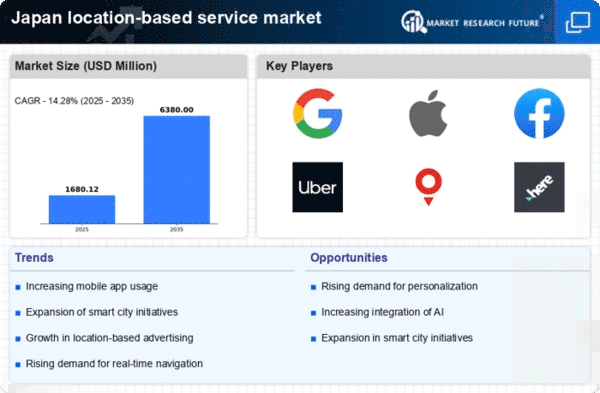Rising Demand for Real-Time Navigation
The location-based service market in Japan experiences a notable surge in demand for real-time navigation solutions. With urbanization and the increasing complexity of city layouts, consumers seek efficient navigation tools that provide accurate directions and traffic updates. In 2025, the market for navigation applications is projected to reach approximately $1.5 billion, reflecting a growth rate of around 15% annually. This demand is driven by the proliferation of smartphones and the integration of GPS technology, which enhances user experience. Furthermore, the rise of ride-sharing services and delivery applications necessitates precise location tracking, thereby propelling the growth of the location based-service market. As consumers increasingly rely on these services for daily commuting and logistics, the market is likely to expand further, indicating a robust trend towards real-time navigation solutions.
Expansion of E-Commerce and Delivery Services
The location-based service market in Japan is significantly influenced by the rapid expansion of e-commerce and delivery services. As online shopping becomes more prevalent, businesses are increasingly leveraging location-based technologies to optimize delivery routes and enhance customer satisfaction. In 2025, the e-commerce sector in Japan is expected to surpass $200 billion, with a substantial portion of this growth attributed to the demand for efficient delivery solutions. Companies are utilizing geolocation data to provide customers with real-time tracking of their orders, thereby improving transparency and trust. This trend not only benefits consumers but also enhances operational efficiency for businesses, suggesting a symbiotic relationship between e-commerce growth and the location based-service market. As the demand for swift and reliable delivery continues to rise, the market is poised for further expansion.
Advancements in Augmented Reality Applications
The location-based service market in Japan is witnessing a transformative shift due to advancements in augmented reality (AR) applications. These technologies enable users to interact with their surroundings in innovative ways, enhancing experiences in sectors such as tourism, retail, and education. In 2025, the AR market is projected to reach $10 billion in Japan, with location-based services playing a crucial role in its growth. By integrating AR with location data, businesses can offer immersive experiences that attract consumers and drive engagement. For instance, tourists can access interactive maps that overlay historical information on their devices, enriching their exploration of cultural sites. This integration of AR and location-based services not only enhances user experience but also positions the location based-service market as a key player in the evolving digital landscape.
Government Initiatives for Smart Infrastructure
The location-based service market in Japan is positively impacted by government initiatives aimed at developing smart infrastructure. The Japanese government is investing heavily in smart city projects, which incorporate advanced technologies to improve urban living. These initiatives often include the deployment of location-based services to enhance public transportation, traffic management, and emergency response systems. In 2025, government spending on smart infrastructure is expected to exceed $30 billion, indicating a strong commitment to integrating technology into urban planning. By facilitating real-time data sharing and location tracking, these services contribute to more efficient city management and improved quality of life for residents. As the government continues to prioritize smart infrastructure, the location based-service market is likely to benefit from increased investment and innovation.
Growing Consumer Awareness of Location-Based Services
The location-based service market in Japan is experiencing growth due to increasing consumer awareness and acceptance of location-based technologies. As individuals become more familiar with the benefits of these services, such as personalized recommendations and enhanced convenience, their adoption rates rise. Surveys indicate that approximately 70% of Japanese consumers are willing to share their location data in exchange for tailored services, reflecting a shift in consumer attitudes. This growing acceptance is likely to drive innovation within the location based-service market, as businesses seek to capitalize on consumer preferences. Moreover, as privacy concerns are addressed through improved data protection measures, the market is expected to expand further. The interplay between consumer awareness and technological advancements suggests a promising future for the location based-service market.

















